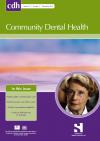Community Dental Health

- Cover Date:
- December 2015
- Vol:
- 32
- Issue:
- 4
Dental utilization disparities in a Jewish context: reasons and potential solutions
Demographic discrepancies in dental healthcare utilization and access to care have historically been studied and attributed to such factors
as socioeconomic status, race, and ethnicity. Such potential discrepancies and contributing factors amongst the Jewish population have
been little explore. Objective: To examine the frequency of dental visits among Jewish subgroups and explored possible explanatory factors for differences in dental healthcare utilization, such as financial constraints, dental anxiety, religious perspectives on health, lack of
perceived need, poor accessibility, and scheduling conflicts. Basic research design: Cross-sectional study. Participants: A religiously diverse
non-clinical sample of 169 Jews completed measures on demographics, dental visit frequency, dental anxiety, and general religiousness.
Results: On average, Orthodox Jews visit the dentist less often than non-Orthodox Jews (OR=0.43) and Ultra-Orthodox Jews markedly
less (OR=0.23). Moreover, differences between these groups in dental visits were largely mediated by differences in dental anxiety, poor
accessibility, lack of perceived need and scheduling conflicts. Conclusion: These results identify a population that is at risk for poor oral
health and suggests possible preventive and corrective interventions.
Key words: utilization of care, social support, community dentistry, culture, Jewish, USA
- Article Price
- £15.00
- Institution Article Price
- £
- Page Start
- 247
- Page End
- 251
- Authors
- Z. Lazarus, S. Pirutinsky, M. Korbman, D.H. Rosmarin
Articles from this issue
- Title
- Pg. Start
- Pg. End
- The feasibility of using an alcohol screening tool in a UK dental setting to identify patients’ alcohol consumption
- 196
- 198
- Long term evaluation of the clinical effectiveness of community milk fluoridation in Bulgaria
- 199
- 203
- Time trends and determinants of acute odontogenic maxillofacial infections in Lithuania: a retrospective national 2009-2013 treatment data audit
- 209
- 215
- Dental anxiety and oral health in 15-year-olds: a repeated cross-sectional study over 30 years
- 221
- 225
- Development and evaluation of a Dental Patient Feedback on Consultation skills (DPFC) measure to enhance communication
- 226
- 230
- A retrospective audit of population service access trends for cleft lip and cleft palate patients
- 237
- 240
- Caregiver financial distress, depressive symptoms and limited social capital as barriers to children’s dental care in a midwestern county in the United States
- 252
- 256
